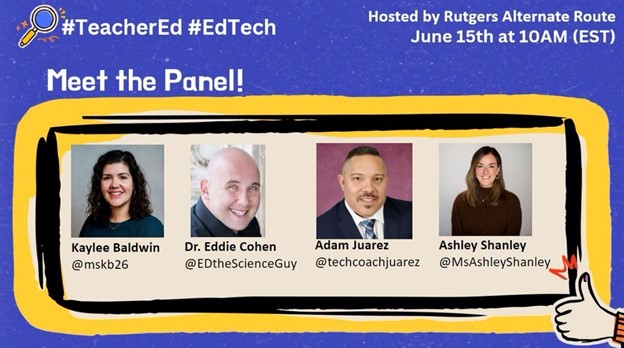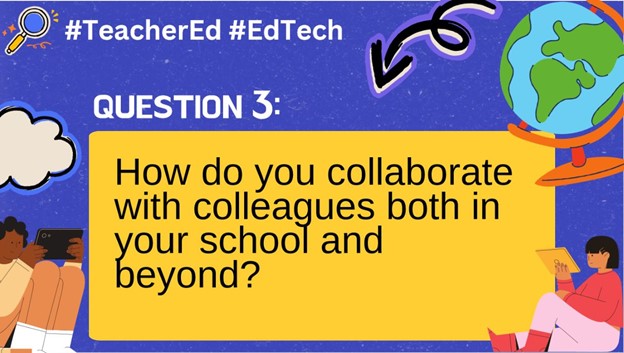Here’s How Teachers Can Use Technology to Collaborate with Colleagues

Most people are aware that teachers wear many hats. They're lesson plan architects, instructional coaches, and cheerleaders for their students. But no teacher is an island. Collaboration is essential for educator success, and fostering a strong network of support can make all the difference.
Recently, teachers from various subjects, grade levels, and backgrounds came together on the social media chat hosted by Rutgers Alternate Route to share their insights on education technology. From various online platforms to struggles and triumphs, everyone had something meaningful to share. They explored how technology enhances student learning and dedicated a portion of the chat to how they leverage technology for effective collaboration with colleagues, parents, and students.
An esteemed panel of educators seasoned in applying technology innovations in education joined the chat to support the participants as guest commentators. During the chat, they shared how they have benefitted from effective collaboration, emphasizing that collaboration isn’t just important for new teachers; it’s essential for every educator looking to thrive.
Guest commentators included: Ashley Shanley, an Instructional Technology Coach at Berkeley Heights Public Schools. She focuses on empowering teachers and students with digital skills, advocating for technology-enhanced learning, and leading professional development initiatives in K-12 education. Adam Juarez, an Educational Technology & Integrated Studies Consultant for Tulare County Office of Education. He supports teachers through individualized coaching, demo lessons and professional development. Kaylee Baldwin, a New Jersey certified special needs educator who found a passion for EdTech while in the classroom and successfully transitioned into her current role of Instructional Technology Facilitator, where she supports teachers and all school-based staff. Dr. Edward Cohen, Assistant Director at the Rutgers Center for Mathematics, Science and Computer Education (CMSCE), has 18 years of experience in innovative pedagogy across K-16 education, focusing on data-driven curriculum and climate change education.

These experienced educators offered valuable insights and support during the chat. They highlighted the benefits of working together, showing how collaboration can create a positive impact in classrooms and beyond while shaping a supportive and engaging learning environment for everyone involved.
Technology Helps Teachers Collaborate
Educators today have a wealth of resources at their fingertips to streamline lesson planning and foster collaboration thanks to technology. Collaboration enhances instruction quality and cultivates a supportive and innovative learning environment for teachers and students. During our social media chat, educators explored the many ways they can leverage online tools, professional communities, and cross-curricular partnerships to build effective lesson plans together. Delve into the invaluable insights shared by these educators themselves, highlighting the benefits of learning from experienced teachers and connecting with colleagues beyond the classroom walls.
Building Lesson Plans Together
Educators today rely on various online tools to streamline lesson planning processes and enable seamless sharing of lesson ideas and resources among grade-level partners. This collaborative approach not only enhances instructional quality but also promotes a culture of mutual support and innovation.

Here are some of the valuable platforms shared by our educators during the chat:
"My grade level partners and I use Planbook, an online lesson planning tool to build our lesson strands and units. We like this tool because we can share lessons with each other easily. As a new teacher it has been a great resource for me."- @LS89672574
“We share a lot of resources through Google drive. We all use the same music software, so it’s easy to transfer and edit files together.” - @dave_lockhart
“During PLC meetings, my fellow math teachers will review Delta Math and IXL outlining what topics or lessons we can include to math our student learning maps.” - @TinaIppoliti7
“Within the school, my grade level team collaborates with lesson plans through the use of tools like Docs and Sheets. We also share resources that we’ve found online to use in the classroom.” -@MadelineMi22206
“My colleagues and I utilize iXL, Kahoot and EdPuzzles to aid in our planning and team lessons.” - @powergraham5000
Finding Inspiration and Support
Online communities dedicated to educational technology are a goldmine for educators. Social media groups and online forums allow teachers to share ideas, troubleshoot challenges, and discover new edtech tools that can enhance their lessons.
Additionally, professional organizations can offer valuable professional development opportunities and connect educators with colleagues in their field. These organizations can provide a wealth of resources, best practices, and a chance to connect with educators facing similar challenges.
Here are some insights from our participants on effective support groups:
“Joining professional organizations in your sphere will support your pedagogy and tech, like for science the NJ Sci Teach Association does monthly PLCs across the state virtually where everything is open discussion, often including tech.” - @EDtheScienceGuy
“I create newsletters & facilitate PD for K-12 staff to assist with district wide needs. I connect with EdTech communities, like @GEGNJ, #GoogleEI & in person groups to share ideas & troubleshoot challenges.” - @MsAshleyShanley
“My supervisor created a Google Classroom for all Health/PE teachers in the district to use as a resource. Admin also facilitates PDs at other schools to observe how others manage their classes.” - @CoachK923
“I have zoom calls with teachers who also teach my class from other schools. Other teachers and I also share resources on google drive.” - @rshames1121
“PE teachers within the district use technology to collaborate and share ideas about lessons that have been successful. Resources are also shared between teachers, and we're made aware by the use of technology.” - @hebron_caleb
Cross-curricular Collaboration
Think outside the silo. Subject area specialists can collaborate with other teachers to find creative ways to integrate their curriculum. Imagine a dance teacher working with a language arts teacher to create a program that celebrates cultural heritage through movement and storytelling. This cross-curricular approach can make learning more engaging and meaningful for students.
Read these creative examples shared by educators:
“For dance if I know something is coming up like Spanish heritage month or African American program, I go to see how we can fuse the two either with classes or technology.” - @jwigg240
“Within the specials team we collaborate all the time. We have time set aside each week for certain meetings. On our team we have the computer teacher, and we have meetings with her to go over different tech resources that will help us in our classroom.” - @TaitLiza
“During my GLM I collaborate with the whole 4th grade team to plan out our weeks ahead.” - @ranamsayed
“Create newsletters, sharing documents, music arrangements, create the "marketing" campaign for the music program, editing/sharing videos from concerts and rehearsals, parent communication creating logistics for events.” - @elmichi89
Learning from Experienced Teachers
Veteran teachers have vast experience and wisdom. New teachers, and even seasoned educators, can benefit greatly from reaching out to a mentor or a colleague for guidance and support. Don't hesitate to ask questions, observe their teaching styles, and learn from their successes. Furthermore, grade-level leads can be a reliable source of support, especially when they're comfortable and experienced with using technology in the classroom. They are often willing to share projects, slides, and other resources, creating valuable collaborative opportunities during grade-level meetings.
Not convinced? See for yourself our educators’ experiences:
“I wouldn't have survived this year without my colleagues linking their Google docs with me. When you have peers who are 20+ year veterans, they make life so much easier.” - @CrunchyKneees
“I have found personally reaching out to people and saying, "I am impressed by what you do...can you help or teach me?" works really well in the teacher world.” - @EDtheScienceGuy
“My grade level lead is more comfortable and experienced with the use of technology in her classroom. Always shares any project she is working on or slides /use of technology. We have great collaborative opportunities during our grade level meetings.” - @BarbaraA2424
“I often have Team virtual meetings with mentors and my old coworkers. We use the same platforms that we can review together and plan activities for small groups.” - @naddhyax_
Face-to-Face Meetings Still Valuable
Email, video conferencing, and online collaboration tools have made it easier than ever for educators to connect remotely. However, there is still immense value in face-to-face meetings and in-person collaboration for those in the teaching profession.
While virtual interactions have their place, the dynamic exchange of ideas and personal connections that occur when educators come together physically fosters a level of engagement, creativity, and relationship-building that is difficult to achieve through screens and digital interfaces. That’s what we learned from many of our chat participants.
“A lot of my collaboration with colleagues at my school is face to face speaking about strategies, content, and best practices. We also use technology to share resources and ideas too though. Technology allows me to view resources from teachers and experts around the country.” - @DavidSpill6607
“Our math department works together to assure students are on the right track throughout the curriculum. We have department meetings and faculty meetings. Also, with after school tutoring it’s a great way collaborate with other math teachers' students.” - @somspachas
“I consult with my mentor every day in his classroom, where several other teachers often come to hang out. It's a great community resource, where we can discuss specific kids and LPs.” - @Kafkaesque83
“I collaborate with my mentor and colleagues through discussions and meetings. We also have lunch together to talk through stressors or self-care.” - @AllisonA37
Collaborate with Us
By embracing technology to collaborate better, educators can create classrooms where innovation thrives and students flourish. Thanks to technology, you, too, can join the conversation and explore practical tips that can transform your classroom and empower every student on their learning journey.
To explore the conversation or contribute your insights, search "#TeacherEd #EdTech" on the X platform or check out our Wakelet that curates the chat.
Also, check out our previously published blog posts addressing this topic:
• Teacher Collaboration
• How Collaboration Fosters Effective Inclusion for Special Education Students
• Teachers Enhance Learning and Productivity Using Technology
• NJ Alternate Route Teachers Talk EdTech on Twitter
If you’re considering following your dream of teaching, Rutgers Alternate Route can offer you the support and training you need to succeed. Be sure to follow Rutgers Alternate Route on Twitter and sign up for Alternate Route’s monthly newsletter for more information and stories from the field of education.

 Sara Hanafi is an undergraduate at Rutgers University-New Brunswick where she is working towards a degree in Cell Biology & Neuroscience. She has worked with Rutgers-GSE as a student colleague supporting data and communications initiatives since March 2024. Published works by Sara are completed in collaboration with the Rutgers Alternate Route Team.
Sara Hanafi is an undergraduate at Rutgers University-New Brunswick where she is working towards a degree in Cell Biology & Neuroscience. She has worked with Rutgers-GSE as a student colleague supporting data and communications initiatives since March 2024. Published works by Sara are completed in collaboration with the Rutgers Alternate Route Team.





